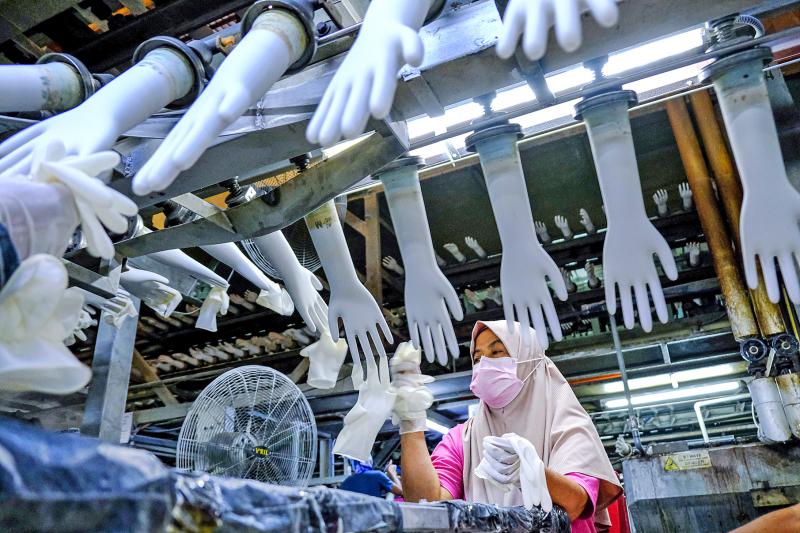Asia’s factories did a better job in the past month than their European counterparts of weathering the supply chain effects of China’s lockdowns and the conflict in Ukraine.
South Korea’s purchasing managers’ index (PMI) climbed to 52.1 last month, recovering some ground lost in March, S&P Global said.
The Philippines, Myanmar and Australia all advanced as well, while only Taiwan proved an outlier.

Photo: Bloomberg
By contrast, the equivalent measure in the eurozone was at a 15-month low.
“It will be important to see how growth momentum is sustained amid ongoing supply chain disruption and sharply rising costs,” S&P Global economist Maryam Baluch said.
China remains a significant risk as the latest surge in COVID-19 cases and subsequent lockdowns threaten to choke off manufacturing logistics and restrain trade.
In the eurozone, a measure of factory activity was revised up slightly to 55.5, but still confirmed to be slowing as shortages of components were aggravated by the Chinese outbreak and the war in Ukraine. Rising prices and uncertainty about the economic outlook also weighed on demand in the currency bloc, with growth in new orders slowing sharply.
The region’s manufacturing sector “looks set for a difficult period of falling production and surging prices,” S&P Global economist Chris Williamson said.
Asia-Pacific economies, which include some of the world’s top exporters, largely held up last month. Weaker activity in China — the top trading partner for much of the region — was offset by renewed demand in other key markets such as the US.
The Philippines recorded its best performance since November 2017, as output and new orders surged.
Taiwan fell — reflecting its deep economic links to China — with its lowest reading since July 2020.
In South Korea, price and supply pressures were exacerbated by Russia’s war on Ukraine and China’s expanding COVID-19 restrictions.
The fallout from China’s pandemic measures was evident in the nation’s manufacturing data, with a gauge of factory activity last month plunging to its lowest level in more than two years, data released over the weekend showed.
Last month’s PMI releases are scattered across several days because of holidays across the region, including Eid al-Fitr in Southeast Asia’s largest economy, Indonesia. Thailand’s PMI is set for release today, with Vietnam and Indonesia following tomorrow and Malaysia’s on Thursday.

GROWING OWINGS: While Luxembourg and China swapped the top three spots, the US continued to be the largest exposure for Taiwan for the 41st consecutive quarter The US remained the largest debtor nation to Taiwan’s banking sector for the 41st consecutive quarter at the end of September, after local banks’ exposure to the US market rose more than 2 percent from three months earlier, the central bank said. Exposure to the US increased to US$198.896 billion, up US$4.026 billion, or 2.07 percent, from US$194.87 billion in the previous quarter, data released by the central bank showed on Friday. Of the increase, about US$1.4 billion came from banks’ investments in securitized products and interbank loans in the US, while another US$2.6 billion stemmed from trust assets, including mutual funds,

AI TALENT: No financial details were released about the deal, in which top Groq executives, including its CEO, would join Nvidia to help advance the technology Nvidia Corp has agreed to a licensing deal with artificial intelligence (AI) start-up Groq, furthering its investments in companies connected to the AI boom and gaining the right to add a new type of technology to its products. The world’s largest publicly traded company has paid for the right to use Groq’s technology and is to integrate its chip design into future products. Some of the start-up’s executives are leaving to join Nvidia to help with that effort, the companies said. Groq would continue as an independent company with a new chief executive, it said on Wednesday in a post on its Web

JOINT EFFORTS: MediaTek would partner with Denso to develop custom chips to support the car-part specialist company’s driver-assist systems in an expanding market MediaTek Inc (聯發科), the world’s largest mobile phone chip designer, yesterday said it is working closely with Japan’s Denso Corp to build a custom automotive system-on-chip (SoC) solution tailored for advanced driver-assistance systems and cockpit systems, adding another customer to its new application-specific IC (ASIC) business. This effort merges Denso’s automotive-grade safety expertise and deep vehicle integration with MediaTek’s technologies cultivated through the development of Media- Tek’s Dimensity AX, leveraging efficient, high-performance SoCs and artificial intelligence (AI) capabilities to offer a scalable, production-ready platform for next-generation driver assistance, the company said in a statement yesterday. “Through this collaboration, we are bringing two

Even as the US is embarked on a bitter rivalry with China over the deployment of artificial intelligence (AI), Chinese technology is quietly making inroads into the US market. Despite considerable geopolitical tensions, Chinese open-source AI models are winning over a growing number of programmers and companies in the US. These are different from the closed generative AI models that have become household names — ChatGPT-maker OpenAI or Google’s Gemini — whose inner workings are fiercely protected. In contrast, “open” models offered by many Chinese rivals, from Alibaba (阿里巴巴) to DeepSeek (深度求索), allow programmers to customize parts of the software to suit their